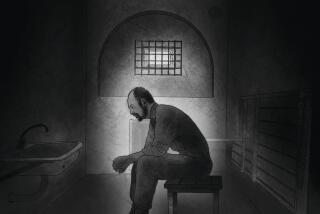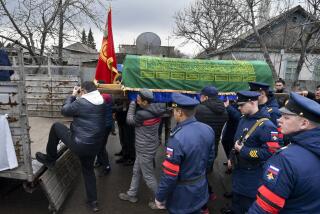Russia’s financial crisis leaves collateral damage
- Share via
MOSCOW — In the fluorescent-lighted dens of despair called pawnshops, bad luck is a commodity as casual as an aging cellphone or a grandmother’s ring, held up for inspection, the sellers holding their breath to see what it’s all worth.
You won’t find Russia’s petro-rich here, but you will find plenty of people who wouldn’t have been caught peddling heirlooms to a pawnshop a year ago -- people too prideful to say they’ve been ejected, at least temporarily, from the middle class. They creep in off the rusting snow banks and from calcified cars, turning gold and silver in their pockets, looking for cash.
On the walls of this Moscow pawnshop are pictures of dreams: a black-and-white shot of Paris, still-life portraits of gold bars and a chest of gold coins. “Attention,” announces a sign. “Drunk clients will not be served.”
Hounded by landlords, determined to bring the same sweets and vodkas to winter parties, turned away by banks, Russians are being driven to the pawnbrokers and their quick-money-for-collateral at unprecedented rates.
With the rest of the country hemorrhaging cash on falling oil prices and tumbling currency, the pawn business is booming -- up 20% nationwide since the onset of the global financial crisis, said Oleg Osipov, chairman of Russia’s association of pawnshops.
“We started to get a totally new category of customer: people who got bank loans for various big projects and now don’t have money to make their monthly payments,” he said. “So as not to spoil their credit ratings, they come to us for short-term loans.
“They got wealthy enough to enjoy precious things, and now they are bringing them to us,” he said.
Anton Chernov is a tall man in a tracksuit, last night’s liquor -- or is it this morning’s? -- still lingering on his breath. An out-of-work jewelry maker, he’s been driven into this pawnshop after losing a string of jobs as the financial crisis chewed its way through Russia.
First, this fall, the workshop where he’d labored for five years abruptly laid him off. He found a slot at a jewelry factory, but only on a freelance basis. They paid him, he snorts, at “rates set by Lenin.” Still, it got him by until the factory too began to feel the pinch of dropping sales.
“At first they started firing people for little things, mistakes, for missing work,” Chernov says. “They did this on purpose, to avoid having to pay two months’ compensation for firing people without reason. I missed one day for a very, very good reason, but they laid me off.”
He scanned the Internet, found no openings in his field and finally decided to try his hand as a security guard. A Muscovite can always find a job, he told himself. He worked two tryout days for a security company, only to be shown the door as that company too folded.
He’s already run through all his gold, so now he’s pawning a set of silver spoons. “We just need to survive. That’s the main task, just to survive these next months,” he says. His cellphone rings; it’s his wife. “Where am I?” he says cagily. “Just out for a walk.”
The pawnshops of a freezing city are full of the pretty things somebody decided to do without, trinkets hocked in hope of better times, hanging in limbo between reclamation and oblivion. Men and women turn their keepsakes over for $50, just enough to get them to the next payday or the next job, and then they’ll be back to collect their mother’s ring. Well of course they will.
Yulia Petrova, a homemaker, is pawning her grandmother’s ring -- and says she wouldn’t tell her husband; she doesn’t want to worry him. “A woman has her secrets,” she sniffs proudly. “It’s not hurting anybody.”
While Petrova murmurs through the metal bars at the cashier’s window, negotiating a price with the clerk, her 3-year-old son runs circles in the room in his snowsuit and boots, racing his plastic car over fading peach paint.
For a country so doggedly used to eking a life out of ever-shifting circumstances, the pawnshop is just another mechanism of survival.
“People just don’t have any money,” pawnshop clerk Tatyana Sermovbrina says. “It’s impossible to borrow money from the bank now, and psychologically you can’t borrow money from your friends, because they’re in the same situation. Basically, we’re the only recourse.”
Behind the counter wink rows of wedding rings, crosses and icons of Russian Orthodox saints. These are the first things that get pawned in times of trouble.
“They pawn everything to solve their problems,” jewelry clerk Irina Yulshina says. “Sometimes they bring amazing diamond necklaces that just shock you to look at them.” There was the woman who brought in the antique diamond necklace, now for sale for $3,500. She never had the cash to get it back.
“Of course,” Yulshina says, “we bought it from her at a much lower price.”
The pawnshop won’t buy anything, no matter how much it’s worth, for more than about $2,000. You don’t get much, but you get it upfront, and no questions asked.
“I’ll buy it back when I get my salary,” says Murad Shakirov, a 38-year-old security guard who is pawning a gold ring for $35. “Prices are getting higher, and I need money.”
He pulls his collar up and heads back into the snow, ready to keep trying his luck.
--
More to Read
Sign up for Essential California
The most important California stories and recommendations in your inbox every morning.
You may occasionally receive promotional content from the Los Angeles Times.










